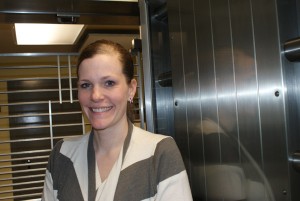Coming Soon: Low-cost Loans for Local Businesses
Coalition for Sound Growth launches new venture with National Iron Bank
By Lloyd Garrison
The non-profit Coalition for Sound Growth is poised to provide modest capital infusions to aspiring entrepreneurs in Norfolk who lack the credit to get a loan that they could afford to repay.
“What makes Norfolk viable,” says coalition President Vint Lawrence, “is the number of small businesses that support the local economy.” Borrowing a Third World idea first spawned by the Grameen Bank of Bangladesh, the coalition intends to raise a fund of $15,000 for use as collateral to enable small businesses to get loans at affordable rates. Low interest loans are especially hard to get for enterprises with no credit history.

“My hands are tied.”
The coalition has enough money in the bank to start the process now, and a fund raising letter is going out shortly to the group’s 150 members.
It was not so long ago that getting small amounts of affordable capital to needy local enterprises were routine transactions for small town banks like the National Iron Bank’s four branches in Litchfield County. In 1999, the year Sue Dyer stepped down as branch manager here to become Norfolk’s first selectman, she recalls that “loan applications were a lot easier when I came in 1977 than when I left.”
The big bank loans that tuned sour and brought on the nation’s financial crisis made loan requirements even tougher. “New regulations require much more documentation” says Catherine Dougan, who recently took over as manager of the bank’s Norfolk and Salisbury branches.
Norfolk residents seeking a loan without collateral or a credit history would face a prohibitively high interest of over 10 percent. “I’ve lived here for 15 years and I know several small business people who are desperate for a low interest loan to expand,” says Dougan, “but my hands are tied.”
Until now. With the coalition’s certificate of deposit in place and specifically backing each loan, applicants could qualify for 2.25 percent interest, the lowest rate available. “Another benefit of having the CD as collateral,” says Dougan, “is that the paperwork is minimal, and you start rebuilding credit right away.”
As interest rates are likely to go up soon, the coalition’s move couldn’t come soon enough for many Norfolk enterprises already struggling with the recession.
“Candidates for a low interest loan have simply to contact the bank for further details,” says Lawrence.
The matter of who qualifies to use the CD as collateral will be shared on a confidential basis with the coalition, which will make the final choice. “We pretty much know everybody in town,” says Lawrence, “and if we don’t know, we know who to ask.” He notes that the coalition’s CD will likely only cover three loans at the same time, but if they prove viable, funds could be sought to cover additional applicants.
Launched in 2002 to block approval of the Yale Farm golf course, the coalition has since moved on to help re-write Norfolk’s Town Plan and reform zoning regulations to make them more up-to-date and user friendly. The coalition also put up half the funding for improving the walkway between Station Place and Town Hall, and has backed the City Meadow Restoration Project, contributing funding and architectural expertise.
The idea for micro lending to area businesses grew out of a discussion about the economy between Lawrence and Libby Borden, the Economic Development Commission’s (EDC) chairman. “This isn’t just a coalition venture,” says Lawrence. “This is a partnership that has the support of the EDC, the bank and Town Hall.”
No one is more pleased than former bank manager Sue Dyer. “This is a terrific idea,” she says. “Anything like this is worth a try, and I hope people will see its benefit and use it.”

